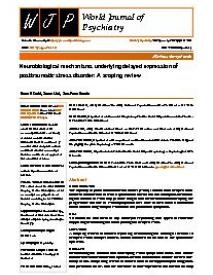Neurobiological mechanisms underlying delayed expression of posttraumatic stress disorder : A scoping review
BACKGROUND
The capacity of posttraumatic stress disorder (PTSD) to occur with delayed onset has been documented in several systematic reviews and meta-analyses. Neurobiological models of PTSD may provide insight into the mechanisms underlying the progressive increase in PTSD symptoms over time as well as into occasional occurrences of long-delayed PTSD with few prodromal symptoms.
AIM
To obtain an overview of key concepts explaining and types of evidence supporting neurobiological underpinnings of delayed PTSD.
METHODS
A scoping review of studies reporting neurobiological findings relevant to delayed PTSD was performed, which included 38 studies in the qualitative synthesis.
RESULTS
Neurobiological mechanisms underlying PTSD symptoms, onset, and course involve several interconnected systems. Neural mechanisms involve the neurocircuitry of fear, comprising several structures, such as the hippocampus, amygdala, and prefrontal cortex, that are amenable to time-dependent increases in activity through sensitization and kindling. Neural network models explain generalization of the fear response. Neuroendocrine mechanisms consist of autonomic nervous system and hypothalamic-pituitary-adrenocortical axis responses, both of which may be involved in sensitization to stress. Neuroinflammatory mechanisms are characterized by immune activation, which is sometimes due to the effects of traumatic brain injury. Finally, neurobehavioral/contextual mechanisms involve the effects of intervening stressors and mental and physical disorder comorbidities, and these may be particularly relevant in cases of long-delayed PTSD.
CONCLUSION
Thus, delayed PTSD may result from multiple underlying neurobiological mechanisms that may influence the likelihood of developing prodromal symptoms preceding the onset of full-blown PTSD.
In: WJP : World Journal of Psychiatry ; ISSN: 2220-3206 | 12 | 1 | 151-168
https://dx.doi.org/10.5498/wjp.v12.i1.151


